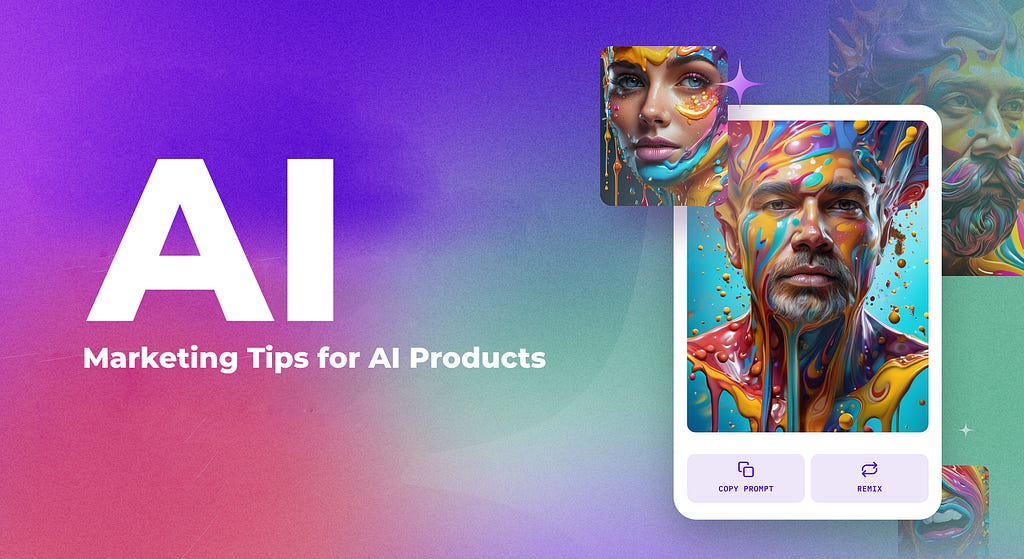AI Generation: Marketing Tips for Targeting AI Products
 AI Generation: Marketing Tips for Targeting AI Products
AI Generation: Marketing Tips for Targeting AI ProductsArtificial Intelligence (AI) is revolutionizing industries with its capabilities to automate processes, analyze data, and improve decision-making. However, effectively marketing AI products requires a strategic approach to communicate their value, address concerns, and engage with a tech-savvy audience. Here are ten essential tips to guide your AI product marketing strategy:
1. Define Value Proposition (Problem Solved & Benefits Offered)The foundation of any successful AI product marketing strategy lies in clearly defining its value proposition. Identify the specific problems your AI product solves and articulate the benefits it offers. Highlight how your solution streamlines operations, enhances efficiency, or improves outcomes for businesses.
2. Identify Target Audience (Industry, Size, Tech Savvy)Understanding your target audience is critical for crafting targeted marketing messages. Identify industries that benefit most from AI solutions, consider company size, and assess the level of tech-savviness of your potential customers. Tailor your marketing efforts to resonate with decision-makers and influencers within these segments.
3. Craft Compelling Messaging (Simplify Tech, Highlight Human Benefits, Use Storytelling)Simplify technical jargon when communicating about your AI product. Focus on the human benefits rather than the complex technology behind it. Use storytelling to illustrate real-world applications and success stories of your AI solutions, making them relatable and compelling.
4. Leverage Content Marketing (Blogs, White Papers, Case Studies)Content marketing plays a crucial role in educating your audience about AI capabilities and building credibility. Publish blogs, white papers, and case studies that demonstrate the effectiveness of your AI products in solving industry-specific challenges. Provide valuable insights and thought leadership to establish authority in the AI space.
5. Engage with Events (Webinars, Industry Participation)Participate in industry events, conferences, and webinars focused on AI and technology. Showcase your AI solutions through demonstrations, panel discussions, or speaking engagements to connect with potential customers and industry experts. Networking at these events can also lead to valuable partnerships and collaborations.
6. Target Social Media Platforms (LinkedIn, Industry Specific)Utilize social media platforms like LinkedIn to engage with professionals interested in AI and technology. Share thought leadership content, industry insights, and updates about your AI products. Tailor your messaging to resonate with specific industries and showcase your expertise in AI development and implementation.
7. Utilize Public Relations (Partnerships, Influencer Marketing)Public relations can amplify your AI product’s visibility and credibility. Forge partnerships with industry influencers, thought leaders, and media outlets to increase brand awareness. Leverage influencer marketing campaigns to reach a broader audience and gain endorsements from trusted voices in the AI community.
8. Build Trust with Transparency (Explainable AI, Ethical Concerns, Data Security)Address concerns around AI transparency, ethical implications, and data security proactively. Emphasize your commitment to explainable AI practices and ethical guidelines in AI development. Provide transparency regarding data usage and security measures to build trust with customers and stakeholders.
9. Emphasize Human Oversight (Responsible AI Development)Highlight the importance of human oversight in AI development processes. Assure your audience that your AI solutions are designed with responsible AI principles, ensuring human control over critical decision-making processes. Position your company as a leader in ethical AI development practices.
10. Educate Your Audience (Website Resources, Content Marketing)Educational resources are invaluable for guiding potential customers through the complexities of AI technologies. Develop comprehensive website resources, such as FAQs, tutorials, and knowledge bases, to educate visitors about your AI products. Use content marketing strategies to continuously educate your audience about AI advancements and industry trends.
Conclusion
Effectively marketing AI products requires a blend of technical expertise, strategic communication, and ethical considerations. By defining a clear value proposition, identifying target audiences, crafting compelling messaging, leveraging content marketing, engaging with industry events, utilizing social media platforms, leveraging public relations, emphasizing transparency and human oversight, and educating your audience, you can position your AI products for success in a competitive market. Implement these ten marketing tips to build awareness, credibility, and trust for your AI solutions, driving adoption and growth in the AI generation.
AI Generation: Marketing Tips for Targeting AI Products was originally published in Coinmonks on Medium, where people are continuing the conversation by highlighting and responding to this story.
